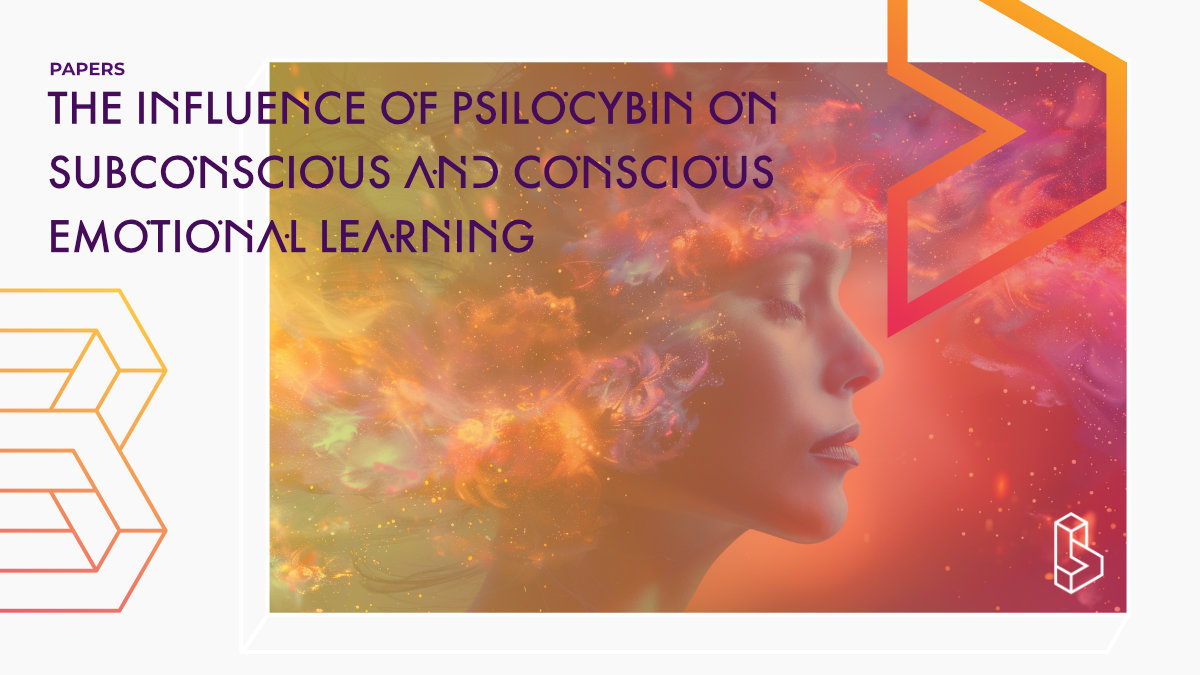This double-blind, placebo-controlled study (n=30) investigates the learning effects of psilocybin (up to 20 mg) in a probabilistic cue-reward task with emotional cues. It finds that psilocybin preserves learning effects, is non-inferior to placebo, and suggests higher exploratory behaviour. The 20 mg group showed significantly better learning rates than placebo.
Abstract of The Influence of Psilocybin on Subconscious and Conscious Emotional Learning
“Serotonergic psychedelics hold promise as a treatment modality for various psychiatric disorders and are currently applied in psychedelic-assisted psychotherapy. We investigated the learning effects of the serotonin receptor agonist psilocybin in a probabilistic cue-reward task with emotional cues in the form of neutral or fearful faces, presented either consciously or subconsciously. This study represents the first investigation into reinforcement learning with psilocybin. Across different dosages, psilocybin preserved learning effects and was statistically noninferior compared to placebo, while suggesting a higher exploratory behavior. Notably, the 20 mg group exhibited significantly better learning rates against the placebo group. Psilocybin induced inferior results with subconscious cues compared to placebo, and better results with conscious neutral cues in some conditions. These findings suggest that modulating serotonin signaling in the brain with psilocybin sufficiently preservers reinforcement learning.”
Authors: Andrea F. Casanova, Andres Ort, John W. Smallridge, Katrin H. Preller, Erich Seifritz & Franz X. Vollenweider
Summary of The Influence of Psilocybin on Subconscious and Conscious Emotional Learning
Psilocybin is a serotonergic tryptamine hallucinogen found in magic mushrooms. It produces mind-altering effects through various serotonin receptors and downstream effects on the GABAergic4, dopaminergic5, and glutamatergic systems.
Psychedelics have been shown to reduce symptoms of depression and anxiety in patients with major depressive disorder, anxiety, and substance use disorder. They may also enhance synaptic neuroplasticity in animals, which might drive cognitive adaptations while facilitating therapeutic action.
LSD was found to increase reward and punishment learning rate in a learning task19, and psilocybin was found to increase striatal dopamine concentration5, with the 5-HT2A receptor hypothesized to activate the DA system29. The DA system plays a pivotal role in learning by capturing novelty through reward prediction errors. Serotonin is believed to maintain a delicate balance with dopamine in learning and behavior reinforcement, and can be affected by depleting 5-HT levels or increasing 5-HT levels with prolonged SSRI administration. To test the effects of a substance on learning, reinforcement learning can be applied. Emotional cues influence learning, with negative cues yielding additional improvement compared to neutral cues, but the duration of presentation of cues also plays a role. We hypothesized that psilocybin would impede learning with negative stimuli, enhance learning with neutral and conscious stimuli, and disrupt learning to a higher degree with subconscious cues than with placebo.
Find this paper
The Influence of Psilocybin on Subconscious and Conscious Emotional Learning
https://doi.org/10.1016/j.isci.2024.110034
Open Access | Google Scholar | Backup | 🕊
Cite this paper (APA)
Casanova, A. F., Ort, A., Smallridge, J. W., Preller, K. H., Seifritz, E., & Vollenweider, F. X. (2024). The Influence of Psilocybin on Subconscious and Conscious Emotional Learning. iScience.
Study details
Compounds studied
Placebo
Psilocybin
Topics studied
Neuroscience
Study characteristics
Original
Placebo-Controlled
Within-Subject
Randomized
Bio/Neuro
Participants
30
Humans
Linked Clinical Trial
Characterization of Altered Waking States of Consciousness in Healthy HumansThis randomised, double-blind, placebo-controlled trial (n=30) studied the characterisation of altered waking states of consciousness induced by psilocybin (up to 20mg) in healthy humans.

